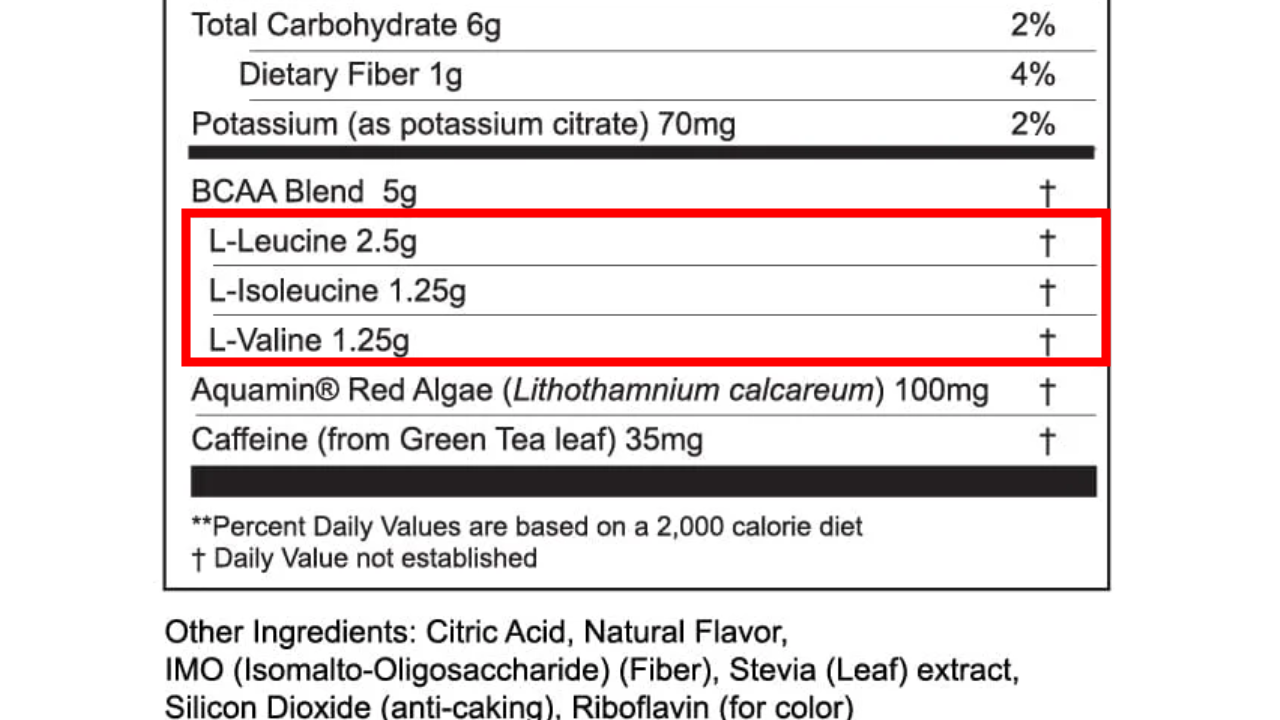When it comes to optimizing workout performance and recovery, many athletes and fitness enthusiasts turn to dietary supplements. Among the most popular are Branched-Chain Amino Acids (BCAAs). These essential nutrients have gained significant attention in the fitness community for their potential to enhance muscle growth, reduce fatigue, and speed up recovery.
But what exactly are BCAAs, and how can they help improve your workout training?
BCAAs refer to three essential amino acids: leucine, isoleucine, and valine. They are termed “branched-chain” due to their unique chemical structure, which includes a branch that extends from the main chain of atoms. These three amino acids are part of the nine essential amino acids that the body cannot synthesize on its own, meaning they must be obtained through diet or supplementation.
- Leucine: Often considered the most critical BCAA, leucine plays a pivotal role in muscle protein synthesis, which is the process by which the body builds muscle. Leucine activates a pathway known as mTOR (mechanistic target of rapamycin), which directly stimulates muscle growth.
- Isoleucine: While it also contributes to muscle protein synthesis, isoleucine is particularly effective in increasing glucose uptake into cells, providing energy during workouts and promoting faster recovery.
- Valine: Valine helps prevent the breakdown of muscle tissue by serving as an additional source of energy. It also plays a role in maintaining nitrogen balance and supporting muscle metabolism.

Table of Contents
The Role of BCAAs in Muscle Protein Synthesis
One of the primary reasons BCAAs are so popular among athletes is their direct involvement in muscle protein synthesis (MPS). MPS is a critical process for muscle growth, repair, and adaptation to training. When you exercise, especially during resistance training, you create micro-tears in your muscle fibers. The body repairs these tears through MPS, resulting in muscle growth and increased strength over time.
Leucine, in particular, is a potent stimulator of MPS. It triggers the mTOR pathway, which is essential for protein synthesis and muscle growth. Studies have shown that leucine alone can stimulate MPS, although the presence of other amino acids enhances the process.
For those engaged in regular strength training or intense workouts, ensuring a sufficient intake of BCAAs can help maximize MPS, leading to better muscle gains and overall performance.
Reducing Exercise-Induced Fatigue
Fatigue is a common challenge during intense workouts, especially during endurance activities or high-volume resistance training. BCAAs have been shown to reduce exercise-induced fatigue, allowing athletes to train longer and with greater intensity.
During prolonged exercise, the levels of serotonin in the brain increase, which contributes to feelings of fatigue and decreased performance. BCAAs, particularly valine, compete with tryptophan (a precursor to serotonin) for entry into the brain. By reducing the amount of tryptophan that enters the brain, BCAAs help lower serotonin production, delaying the onset of fatigue.
This mechanism is particularly beneficial for endurance athletes such as runners, cyclists, and swimmers, who need to maintain high levels of performance over extended periods. However, those involved in strength training or high-intensity interval training (HIIT) can also benefit from reduced fatigue, allowing for more repetitions, longer sets, and better overall training outcomes.
Enhancing Recovery and Reducing Muscle Soreness

One of the most challenging aspects of regular training is dealing with delayed onset muscle soreness (DOMS). DOMS typically occurs 24 to 48 hours after intense or unfamiliar exercise and can significantly impact subsequent workout performance.
BCAAs have been shown to reduce the severity of DOMS, helping athletes recover faster and get back to their training sooner. This effect is believed to be due to the ability of BCAAs to decrease muscle damage during exercise. By reducing the extent of muscle damage, BCAAs minimize the inflammatory response that contributes to soreness.
Additionally, BCAAs can help replenish amino acid levels in the bloodstream, supporting faster repair and rebuilding of muscle tissue. This is particularly important for athletes who train frequently or those engaged in high-intensity or prolonged workouts, where recovery time is crucial for maintaining consistent performance.
Supporting Fat Loss and Muscle Retention
For those looking to lose weight or reduce body fat while preserving muscle mass, BCAAs can be a valuable tool. During periods of caloric deficit, the body tends to break down muscle tissue for energy, which can be counterproductive for those aiming to maintain lean muscle mass.
BCAAs, particularly leucine, help prevent muscle breakdown by promoting muscle protein synthesis even when calories are restricted. This makes BCAAs a popular supplement during cutting phases or for those on low-calorie diets. By preserving muscle mass while losing fat, BCAAs help athletes maintain strength and performance levels, even when energy intake is reduced.
Moreover, BCAAs have been shown to enhance fat oxidation (the process by which the body burns fat for energy) during exercise. This dual effect of preserving muscle while promoting fat loss makes BCAAs an attractive option for those looking to improve body composition.
Improving Mental Focus and Reducing Stress
While much of the focus on BCAAs centers around their physical benefits, they also have a positive impact on mental performance. During intense or prolonged exercise, mental fatigue can be as challenging as physical fatigue. BCAAs can help improve mental focus by reducing the production of serotonin in the brain, as previously mentioned.
Serotonin is not only associated with physical fatigue but also with feelings of tiredness and decreased motivation. By modulating serotonin levels, BCAAs can help athletes stay mentally sharp, focused, and motivated during workouts.
In addition to improving focus, BCAAs can also help reduce exercise-induced stress. Prolonged and intense exercise can increase levels of cortisol, a stress hormone that promotes muscle breakdown and fat storage. BCAAs, particularly leucine, can help mitigate the effects of cortisol, supporting a more anabolic (muscle-building) environment.

Optimizing Performance in Endurance Sports
Endurance athletes, such as marathon runners, cyclists, and triathletes, often face unique challenges when it comes to maintaining energy levels and muscle integrity during long periods of exercise. BCAAs have been shown to provide several benefits specific to endurance sports.
- Energy Production: During prolonged exercise, glycogen stores (the body’s primary source of energy) become depleted. BCAAs can serve as an additional source of energy by being converted into glucose in the liver, helping to sustain performance during long-distance events.
- Preventing Muscle Catabolism: Endurance athletes are at risk of muscle breakdown due to the extended duration of their activities. BCAAs help prevent muscle catabolism (breakdown) by providing an alternative energy source and promoting muscle protein synthesis, even in a caloric deficit.
- Improved Recovery: The anti-catabolic properties of BCAAs help reduce muscle damage and support faster recovery, allowing endurance athletes to maintain a consistent training schedule without excessive muscle soreness or fatigue.
Timing and Dosage: How to Maximize the Benefits of BCAAs
To fully harness the benefits of BCAAs, it is essential to understand the optimal timing and dosage for supplementation.
- Pre-Workout: Taking BCAAs before a workout can help reduce fatigue, enhance mental focus, and provide an additional energy source during exercise. This is particularly beneficial for those engaged in endurance sports or high-intensity interval training.
- Intra-Workout: Consuming BCAAs during a workout can help sustain energy levels, reduce the onset of fatigue, and minimize muscle breakdown. This is especially useful for longer training sessions or competitions.
- Post-Workout: Taking BCAAs after a workout supports muscle protein synthesis, reduces muscle soreness, and accelerates recovery. This is the most common time for BCAA supplementation, as it helps replenish amino acid levels and repair muscle tissue.
The optimal dosage of BCAAs varies depending on individual goals, body weight, and training intensity. However, a common recommendation is to consume 5-10 grams of BCAAs per serving, with at least one serving taken around the time of your workout.

Potential Side Effects and Considerations
While BCAAs are generally considered safe for most people, it is essential to be aware of potential side effects and considerations.
- Kidney and Liver Function: Those with pre-existing kidney or liver conditions should consult a healthcare professional before taking BCAAs, as excessive intake could strain these organs.
- Interactions with Medications: BCAAs may interact with certain medications, particularly those that affect blood sugar levels or are used to treat diabetes. It is advisable to speak with a healthcare provider if you are on any medication before starting BCAA supplementation.
- Balanced Diet: While BCAAs can be beneficial, they should not replace a balanced diet. Whole foods, such as lean meats, dairy products, and legumes, provide a broader spectrum of amino acids and nutrients necessary for overall health and performance.
